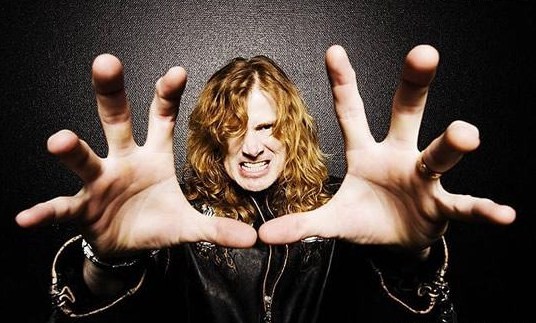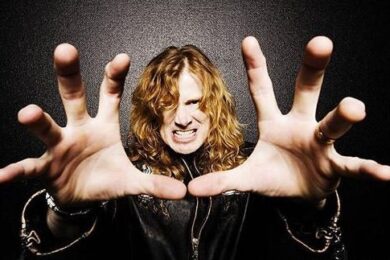Despite an unhealthy amount of vilification over the years – some of it justified, some of it less so – Dave Mustaine is, in heavy metal terms, still one of the biggest box office draws out there. There’s little doubt that his emotions have always been close to the surface, and when you consider his well-documented battles with drugs and alcohol over the years, it’s of little surprise that some of his interviews have made rather controversial reading. Recent years have been a little kinder to ‘Megadave’ though, and with a new and highly proclaimed devotion to Christianity and recent albums that would suggest renewed creativity, the timing of his memoirs entitled simply Mustaine: A Life In Metal really couldn’t have been better scripted.
If any further house-cleaning was required, the recent Big Four concerts in Europe which finally put him on the same stage as his nemeses merely added to a sense that 2010 represents the end of one chapter, and the dawn of a more laid-back period in his life. Mustaine is almost 50, remember, and while he’ll always be one of the most intelligent and painfully honest voices in current metal music, he still retains that ability to divide fan opinion with what comes out of his mouth at times; and one suspects that will always be the case. His memoirs are honest, certainly – and not without that trademark bite – but there is also considerable maturity in his words now, which would suggest that Dave Mustaine is as happy to live and let live as he has ever been.
Mustaine: A Life In Metal has been out a few weeks now. How long was the gestation period for this project?
Dave Mustaine: Well, originally the book was going to be entirely different. It was going to be about the songs – whether it was The Crusades or whatever the subject was – with the focus being on what each one meant, and the various idioms and one-liners within all those songs and also who it was all aimed at.
So what happened?
DM: I turned the finished book in to Sanctuary and then that company folded. They just told me: "We’re closing down the publishing company, here’s your book back." I just said "Oh, ok," and I thought it was really cool that they had paid me for the book but didn’t ask me for the money back. We just went our separate ways, and I had the book. I thought ‘Well, so much for my journalism!’ [laughs].
But you didn’t give up on it?
DM: No I didn’t, but when I got a new manager, I talked to him about everything I had dreamed about as far as this book was concerned. Because our management company is one of the biggest in the world, that gave us so much clout both over here in the US and over there, and because of that we went straight to Harper Collins and got a book deal – the Mercedes Benz of book publishers. All the staff at both the US and UK offices have been so easy to deal with, and as a result, this whole process has been nothing but fun for me. From when I first introduced myself to my co-writer, until the book was actually released, was probably a year or so.
How much physical writing involvement did you actually have? Are you telling me you sat at a keyboard and typed?
DM: We talked every day for like six months; we had an appointment every morning. I’d have my morning coffee and he would have a morning phone calls. Some of those phone calls were very bleak though, and I don’t even remember some of them. In those days I would be up working until late, and then getting up at six in the morning to talk on the phone was pretty hard for me. We talked and talked and talked, and it’s all a credit to what a great writer Joe is. He’s currently doing Ace Frehley’s biography, in fact.
How much directional power did Joe Laydon have?
DM: The cool thing was that sometimes when we were writing the book, there were some stories I told that made him say ‘Man, are you sure you want to put that in there?’ Sometimes I would say ‘You know, maybe not,’ and the reason for that was that it was only going to hurt somebody. There’s stuff that happens in the course of our lives that’s funny, but at the end of every joke there’s a punch-line, and that punch-line is usually somebody. We just looked at it and decided to stick to the facts. We wanted to keep the rock & roll element – keep it sexy, fun and happy. I look at all the bad things I have done in my life from the point of view of the solution, rather than a ‘fuck it, I can’t do this right’ type of way. Somebody once said – and it might have been H.G Wells – that you’re either part of the problem, or you’re part of the solution, and that’s how I try and live my life.
How cathartic a process was the writing of the book?
DM: Very much so. It was certainly important for me in my role as a figurehead for the heavy metal genre. As you’ll know, in 1992 I covered the Democratic National Convention at Madison Square Garden for MTV. Of course I turned up there with long hair, a flannel shirt and they didn’t know what to think. I was the unofficially elected representative for the disenfranchised youth of America and I was out there asking perfect questions and made an eloquent speech. Of course I had kissed the Blarney Stone first, so luck was on my side! [Laughs] So, being able to put this book out has made people think: ‘Wow, this guy can actually put a sentence together without saying ‘fuck’.’
Given that you’ve been fairly acerbic with the press over the years, it was surprising to see how restrained you were in dealing with some of the Metallica issues in the book – very few cheap shots are taken at all, in fact…
DM: I don’t think there’s ever any point in cheap shots, period. I mean, if you’ve got an opponent, then get in the ring – don’t throw mud back and forth at each other. If you’ve got something to say, just say it. If it’s fighting words, let’s get it on. I’m almost 50 now, and when you get to my age, you don’t fight any more. When I got my first black belt, I was talking with my sensei, and he was a half Mexican and half Native American. I talked to him and got some great insight into what happens when the Native American chiefs get too old to compete; they have warfare mentally. I loved this guy so much that when I did my side-project MD45, there was a song on that record called ‘The Creed’, which was about people who knew martial arts and the warrior creed generally.
I mean, just because you know a martial art, doesn’t mean you know how to fight, and there are a lot of guys with martial arts ranks that wouldn’t last ten seconds in a street fight. That warrior mentality is what I was referring to.
Did you fear legal comeback in any way, when you were dealing with some of the more contentious aspects of your story?
DM: Well no, because I have already confessed what my part was in all the stuff with Metallica – both the things that had gone right, and the things that had gone wrong. We’re friends now, and my goal wasn’t to set the story straight so that people liked me, it was just to set the story straight. I just wanted to say ‘Hey, I did that, and also, I didn’t do that’ – if that makes sense.
It certainly does. Was the Big Four reunion as significant, or more significant, than writing your book?
DM: The book could have come and gone, and nothing would have confirmed that there was any progress with the rehabilitation of our friendship. However, at the Big Four thing we were in each other’s midst, and were able to see each other and be able to do what words just couldn’t do. We looked each other in the eye. James and I had a moment where we both apologised for something and both hugged after it, and that’s the kind of stuff that people just don’t see. The press just keeps going and going and going, and eventually you feel like saying ‘Can’t you see that there is no feud?’ I mean, we’ve already played on stage together. [Laughs] Do James and I have to have a love child together to show it’s all cool?
So there was a defining moment where your friendship was re-established?
DM: Yes there was. Before we went onstage to play the song together, I hugged Lars – he was all happy, and I also hugged Kirk. Then after we were done, I went over and hugged James and the cheer from the audience when I did that was louder than when we were playing, it was really remarkable. James Hetfield and I are like the big daddies of this whole thing; kind of like the guy with the white hat and the guy with the black hat.
Unfortunately, I was the guy with the black hat. We’re both on the same page, and the good thing is that at the end of this experience we shook hands, hugged and knew that there is going to be another day. And until then my friend, ‘So long’.



